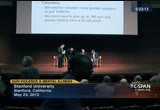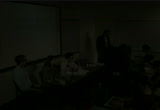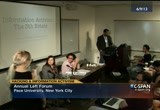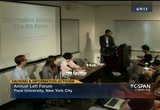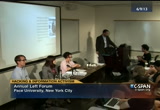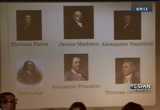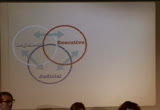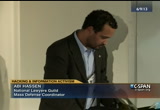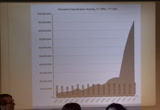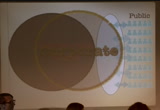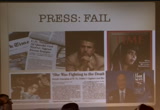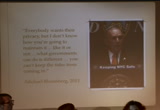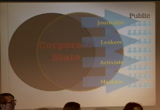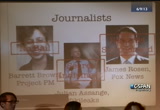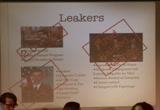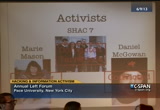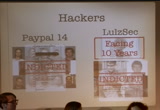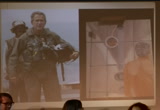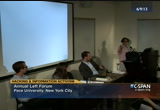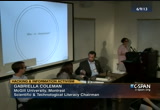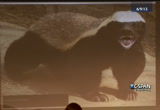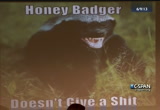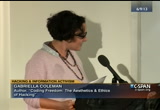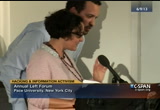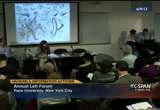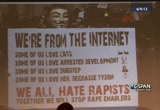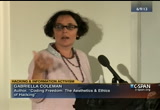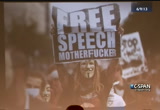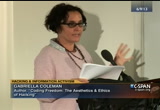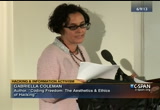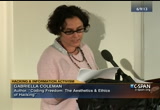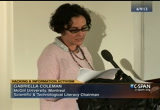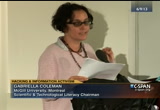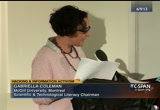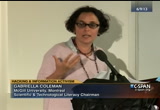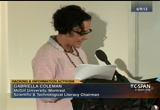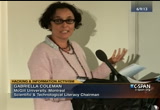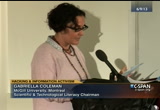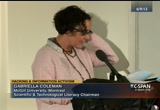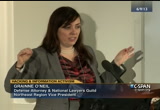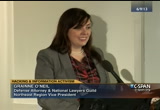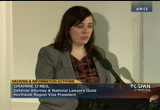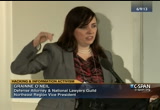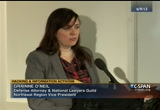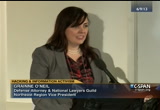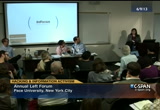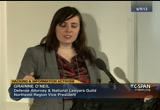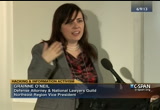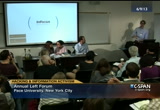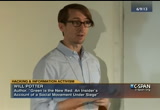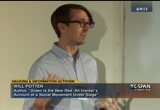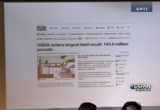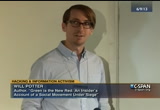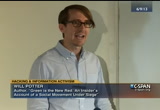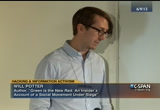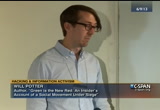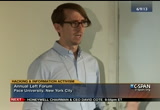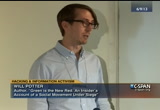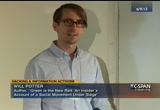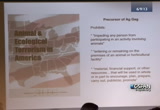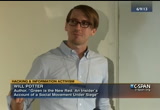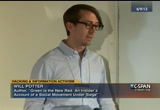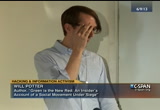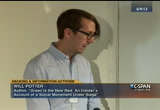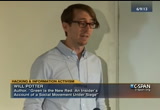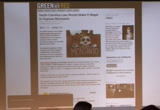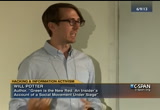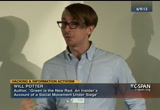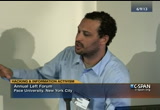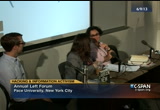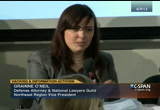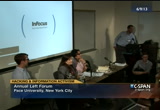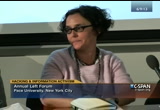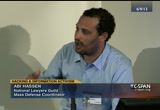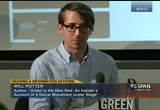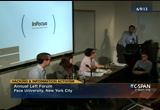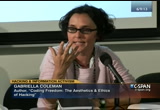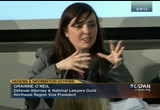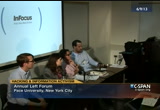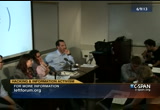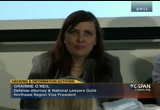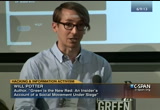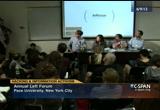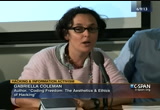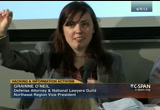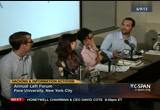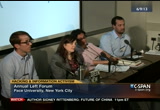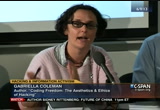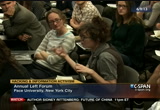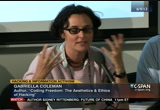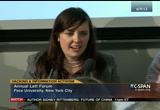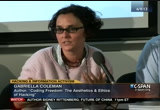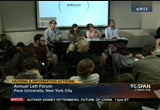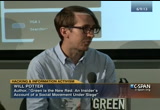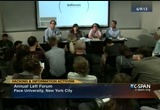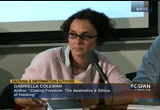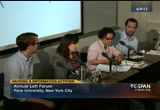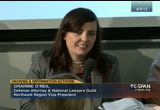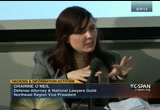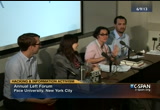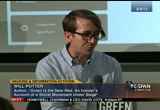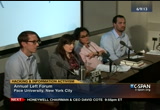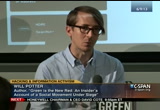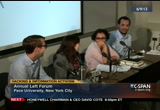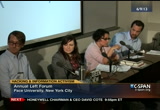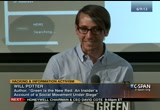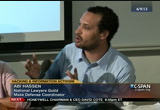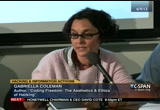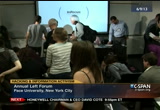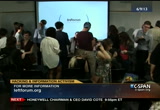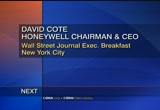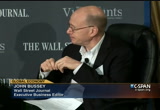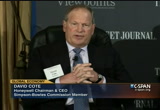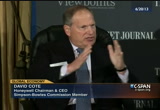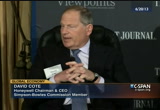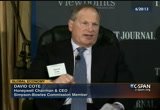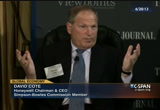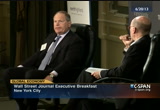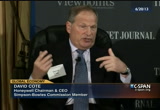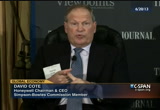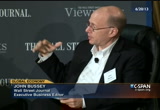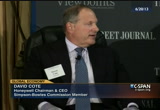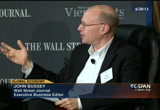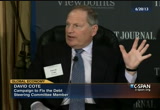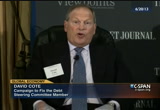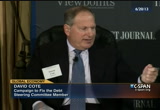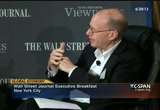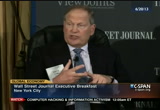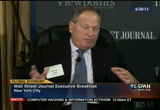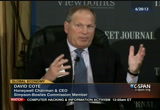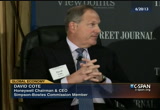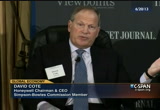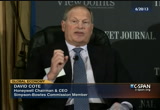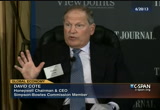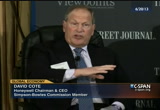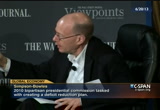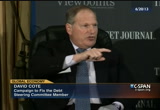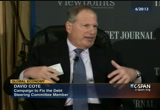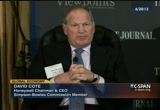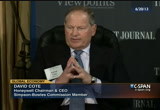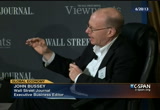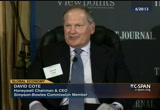tv Politics Public Policy Today CSPAN July 5, 2013 8:00pm-10:31pm EDT
8:00 pm
>> tonight, a discussion about activist computer hacking. then an interview with david cody. and then, 30 years living in china. no man needs a strong partner more than the imagine -- american president. that is what i concluded after five years and interviews, those presidents with brave spouses willing to speak sometimes hard truths that others are will -- unwilling to speak, those presidents have a distinct
8:01 pm
advantage. had pat nixon been able to cut through her husband's paranoia, watergate may have been avoided. they were leading virtually separate lives as you'll see in my portrayal of this status of all presidential couples. , do not give my husband advice she was quoted as saying. if there are man or woman alive who doesn't need advice from the person who knows him or her best? >> we continue our conversation on first ladies. at nine" eastern on c-span. >> this discussion computer hacking.
8:02 pm
this is two hours. -- she is the scholar on these topics. her first book, "coding freedom" is published by princeton university. she is working on a book on goonymous and digital media. to her website. -- as a prolific's beaker prolific speaker. you can find a lot of her stuff that is really amazing. will potter is another amazing writer, journalist, author and public speaker. he is a leading authority on the animal rights and environmental movements. you can find his writing in
8:03 pm
outlets such as "rolling stone," "mother jones," "the los angeles times," "the washington post." he is also on radio. i suggest seeing a recent debate that he had with animal industry pr person that was great. i think will won. his book "green is the new red" provides an excellent look at the post-9/11 assault on the animal rights and environment movements, and labeling activists and terrorists. last but not least, grainne o'neill, lawyer for the hacktivist jeremy hammond. she recieved a jd from columbia law, and a ba in mathematics and computer science from cornell.
8:04 pm
she was a public defender in new orleans.she became direct or of the legal systems of technology, and developed new tools to enhance the performance of her fellow attorneys. a round of applause for these panelists. [applause] i am going to start off with an introduction, laying a framework about what is information activism, and why it is important for democracy. this is an excellent quote. this is thomas jefferson. it lays out two important things, i think.
8:05 pm
information is necessary, a necessary fuel for the democratic fire. the mechanism that was used for this in the founding period really was the separation of powers and in the bill of rights. the freedom of the press. it is the mechanism that allows information to be desseminated to the public. when we talk about what it means, all of these founding fathers were members of the press as well. the press at this time was not a corporate moneyed press. it was a political, vibrant,
8:06 pm
independent press. the constitution says freedom of the press, it means the freedom anonymously, as well as what we are doing. normal within political discourse to speak anonymously. that is something that has been lost in our concept of free press. in a sense, these guys were the anons. i was talking about the information. how did it flow in checks and balances? i'm representing information with these blue arrows. the constitutional system requires a flow of information between the branches of government. the government cannot work when that, when the information is distracted.
8:07 pm
-- disrupted. -- the press is this mediator between the back and forth. here, it is not particularly exclusive or contemplative within our framework, which is the corporation. especially during the beginning of the founding of the country. the corporation was a body of government. any information that corporations provide or force to provide his revolt -- is a result of law. corporation is a legal fiction. this is a trend that we have seen over the past few years, which is -- to be 60-70 years.
8:08 pm
an expansion of the executive branch of government. an increasing opaqueness to that branch am i taking over the other branches of government, and restricting the flow of information from all branches of government. often aided by the other branches of government. isew examples of this, this the number of documents that have been declassified, starting in 1980. that you can see the trends. especially compared to over similar time, this is the number of classifications of documents that have been classified. you can see the spike here, which is the creation of a whole separate internet. it is the world's largest dark
8:09 pm
net. a governor -- government contractor, semi private arrangement where massive amounts of information are being shared. that involves, the last figures i saw were 5 million people contractors with access to this pacified world. .- classified world back to our diagram. the executive has gotten larger and more opaque. time, the corporate sector has gotten larger. this is adequate. what we really have seen in the world of government information is emerging of the corporation and the government at a large -- and a large part of the press. it involves the military-
8:10 pm
industrial complex, and all of these forms of national security. the press is a huge part of that. we have seen the corporate press get in -- with this system. ,ou can't make corporate press the haiti of the corporate press -- the heyday of the corporate press, that actually had an affect on the public. seen the corporate ta --where we are to today, propaganda for war. i do not think anybody embodies us more than thomas friedman in terms of the vacuous
8:11 pm
warmongering nature of the corporate media. ave a number of corporations that control the media over this time that we are talking about. it tells that story in another way. stage. this corporate we have small amounts of information being mediated through actual media. we have large amounts of propaganda coming through the media. a hugesame time, we have amount of information coming from the public into the whole. the black box of the corporate state. i do not think anyone embodies us more than michael bloomberg, who orchestrated massive spying campaigns. he was the master of massive
8:12 pm
spying campaigns on the muslim community. he says this type of spine is inevitable. to put it simply, we have seen massive increases in corporate and government secrecy, a decrease in individual privacy. , we'rehe nsa revelation about here. who has taken on the corporate state? has there been -- what are the successes, the mechanisms which information has come out? i have broadly outlined four categories. when i said journalist, i do not mean the people on tv. i am not talking about brian williams. green walls of the world, people who are taking on power. people who are not within the power system, but were trying to take it on. , andakers, activists
8:13 pm
hackers. i'm going to go through examples of the corporate state response to people within these categories. journalists, a few examples. james rosen's is not independent journalist. -- an assange, and the private, public workings up in ahas been set really bad situation by the fbi, facing 100 years worth of charges and denied bail in a jail in texas. .e see leakers
8:14 pm
bradley manning, these are people who are exposed to certain degrees of government wrongdoing,vernment and torture programs. , millions ofpeople dollars wasted on bundling money to private hands for useless projects. bradley manning exposing war crimes. they have been treating accordingly. -- bradleyg is manning is facing a life sentence. the nsa whistleblowers are all career long nsa people, their homes raided and careers ruined. here is another category of activists. these are animal rights activists who have been very
8:15 pm
effective at their work. there was a huge campaign against them, very successful at damaging the credibility. it is an effort to stop their practices. the phenomenon that we see here usedrrorism prosecutions against these people. no one here actually harmed or intended to harm any person. these are animal rights activists. nonetheless, they have been treated as terrorist. , labeledentence terrorist. 7 ran a website.
8:16 pm
that was their crime. these are the more famous hacking groups. the paypal 14 were accused of d dos-ing paypal sites. you requested website over and over again in an attempt to slow it down or stop temporarily. they have all been indicted with federal charges. similar.s their main hacking charges for breaking into a company, extracting documents, and releasing them to wikileaks. of illegal lots activity, spying on activists, bribing foreign officials.
8:17 pm
these are things that were exposed. the government has chosen to prosecute the people who expose rather than the corporate malfeasance. i'm going to close and open it up to gabriella next. i wanted to and with this slide. i think it is a really telling story that this is a painting, by george w. bush of himself, released by hacker. story. that this tells a hen contrasted to what wants you to think of him as, whatis the world that -- is a reality? what is the world want to live in? -- or themore power
8:18 pm
real world? where power is exposed. i want to welcome gabriella. [applause] >> i will just up and by putting thell for panel panel together. it is great to be here. also, for those, recognize a few people in the audience to sell my talk i gave a few days ago. it is similar but longer. there is added value. i wanted to mention that. what i'm going to do today is actually, the first half is to give background on anonymous. there's is quite a bit of misinformation about them. what is addition about them is that they are a domain where hackers are important, but they are more open than that. they integrate participants from many different backgrounds, one
8:19 pm
of the reasons why they grown so much. they talk about why they are so important, and way they are so distinctive at some level. as wes important because get to the crackdown against them, it is a crackdown against the rise of civil disobedience online. it is in its early history. crackdowns really can have an affect. i am just want to start now. -- i am just going to start now. you can see all of my slides. here is a question without an easy answer. who is anonymous? after four years of research, i still struggle for an adequate answer. since 2000, different groups of hackers have organized very different groups using this
8:20 pm
name. participants have taken on very diverse causes, from rape cases to leaking. a rally most around censorship and privacy. one thing is certain. anonymous is tailor-made for the news. it is widely actioned, it feeds into the media's appetite for the sensational. two of theorrect most common misconceptions about them. many journalists portray them not only as hackers, but is something like the honey badgers of activists are -- activision. the honey badger is a frightening and fastening animal.
8:21 pm
incredibly brave, incredibly stupid. apparently, it can propel lyons and go after honey bees. --ically, the slides that should work. ok. hopefully double fix the problem. the honey badger is frightening, incredibly brave and stupid. like the narrative goes, these hackers just to not give a shit. thatare just quite shocked their actions may seem more mature. this thing is possessed.
8:22 pm
let's see if this takes care of it. i is for this reason that have been asked over 20 times transition.ous's every time they do an operation it seems more mature, they say they are maturing. they are going into adulthood. fair enough. the birth of anonymous can perhaps be located as a time of transition. for those that may not know, prior to the name being used for activism, the name anonymous was used primarily for internet trolling and cranking. hat they call internet -- do you know? it is not my computer.
8:23 pm
basically were named by trolls to go on cranking campaigns. in 2008, they went on a campaign against the church of scientology. through a very complicated set of reasons, they decided to earnestly protest the church of scientology. a political movement was born. [inaudible] it still does. sorry about this. let me try one more thing.
8:25 pm
8:26 pm
part of what they do. if we are going to identify the honey badgers of anonymous, that title can be reserved for lulzsec. they had to break away because there was no rhyme or reason for their hacks. they went on a hacking spree. it revealed a lot of important information. it certainly is the case that they had to break away. anonymous had developed a political culture where they basically got triggered into action for reasons. it was still very important, because it inspired hackers to continue hacking in this again. a lot of individuals got sec.lved with anti-
8:27 pm
internetrn out of the internet humor. operations are earnest, but if an opportunity arises, someone might inject a dose of lulz. anonymous was spurred into action when rapid transit sought to shut down phone reception to and type police -- anti-police brutality. individuals hacked into computers, and someone found a mood -- a semi nude photo and republish it on the website with this rationalization. if you're going to be a day to the public, i am sure you do not mind showing it to the public. reminds --d humor
8:28 pm
remain a part of the culture. who was anonymous may be heart -- hard to answer. it is best viewed as a protest ensemble. it is the face of popular unrest across the globe, the streets of spain, to the streets of turkey more recently, and even they showed up in the parliament chambers when polish commentaries took on the masks to protest the copyright statute. itsymous is unique in unpredictability. it is also part of a broader the system -- ecosystem, weapons of the geek. an increasing number of hackers and geeks are taking political matters into their own hands. hackers seem to be everywhere. they are misunderstood. i think there are many things i can say to clear up the
8:29 pm
misunderstandings. the one thing i want to say is that they are not all libertarians in basements. those exist, but really it is a very diverse group of individuals who exist all over the world. their political interventions have intervened in a number of ways. hackers have reinvented the law. those that oppose copyright have created the copy left. tools tove built prevent from corporate snooping. there are dozens of other examples which come to mind. educatingy geeks are politicians and d.c. in this, anonymous specializes in defiance of protest. they are good at three things.
8:30 pm
the first is they are good at amplifying existing causes. in this way, they are very event driven and reactive, which is what makes them unpredictable. toking and linking are proactive exceptions to these. they are good at boosting existing oppositional social movements, whether it is in turkey or the occupy, or the arab spring. they become a really important pr wing. the one that i think is most interesting is when they convert discontent into tangible form. did this well when the budget companies -- when a bunch of companies stopped accepting donations for wikileaks. joined in people then with anonymous to ddos these websites.
8:31 pm
it became an action. hone in on what makes them distinctive. sorry about the slides. i am fighting with them. anonymous has taught us that the internet will judge swiftly the actions of individuals, corporations, and governments. they exploit our digital predicament. whether it is accessed legally or illegally, it is impossible to contain and sequester. and that the publicity, anonymous can create a pr nightmare for its targets. they're hot what i said it makes them on the one hand familiar, and the mistry keeps the media's sensation -- well fed.
8:32 pm
anonymous is good at ruining reputations. they are notorious, and it is difficult to smear there's. congealnot need to funders pray without a master plan, gives them expend mental freedom and thought and action. occasionally, they been branded terrorist. this damagingly was not stuck. why have they grown so rapidly? there are many reasons. i am just want to highlight a few. they are the quintessential anti-brand brand. allowing the idea and into taken by anyone. they are far more open and accessible compared to other spheres of hacker activity. hackers are essential. leakhunt information to and that the majority of the headlines. however, anyone can join simply by saying so. this is an important point. most people join existing groups
8:33 pm
or networks of which they are simultaneously inexistent. they are often this idea that they exist out in the ether. in fact, you can go and find them and talk to them. kay'sckers write to me to , edit videos. organizers are important for the advise and inspire between groups to form teams. beauty relies in its openness and flexibility. they are difficult to predict, much less govern. it's is good because it prevents assimilation and neutralization by institutional actors, including political groups. they like to boast that we are not your personal army. that is the question as to whether their actions can be
8:34 pm
counterproductive. ariba critiques leveled against anonymous. they say they are going to be used to pass repressive laws that curtail civil liberties. this is a ridiculous argument. though civil liberties have already been so curtailed and ,roded that they didn't exist and we would still be in the same boat that we are, which is a frightening sinking boat of privacy. anonymous has to be seen as a reaction to and not a cause of this trend. why they are so important is most importanthe training grounds for activists. this is really important. they are a factory generating a bunch of activists. i participating in anonymous, individuals become part of something larger than
8:35 pm
themselves. i've collected many narratives of individuals who have gotten involved, either a seasoned activist, or as first-time activist. one my favorite is a video editor who has made over 90 videos for anonymous. he recently made a video for operation guantanamo, that was incredible. i will pass the leak around if i can. he just graduated from high school in may. it is a good indication of the way that anonymous acts. anonymity is really their political culture. the first thing i want to emphasize is that it actually diversity among those who have participated. that is because you do not -- you are not identified as a leftist, or being of a certain class. what has allowed for is a really
8:36 pm
odd conglomeration of people. there are wealthy engineers, high school students, phd students, queer a nonce, recovering addicts, activists, movies, political variations. when you hide yourself and your background, where connections are fried. i find this fascinating and important. on the flip side, there is a tension that arises. especially among those to break the law, or those that come for the lawbreakers. you may initially hide the self, but once you engage in prolonged action, you create to share the self, desires, and dreams. and whenme friends,
8:37 pm
they probably should not. one hacker cap to the conundrum in the following way when he was chatting with me. -- the hardest is the silence. women have trouble and stress. there is a want talk to grade no friend to understand. the advantage is they can resurrect and work again. i will keep following, there is no changes for you. he is confessing to me what makes it so hard, and what is great about anonymous. he can reinvent himself. you can reach out to others and trust others. the downfalls of the individuals came at the heels of them revealing too much information about themselves. there is interesting than next to the anonymity.
8:38 pm
what i would like to mention as a transition is that independent of the social logical dynamics, there are ethical dynamics when it comes to their commitment to anonymity. concept saves multiple ethical biodel -- categories. this is important because i do not think there are many bases where the anonymity is thriving in a cultural sense. while anonymous cannot be pigeonholed into a single political position, there is ethical consistency to their actions. there is a collective prohibition to seek fame and attention pre-many are committed to the -- captured in this quote. masking an anonymous a surly not
8:39 pm
always have rolled -- a road to travel on. it can be about the right not to understand, to confuse, to tease, to parody others. he right not to be taken literally, to live a life. finally, anonymous through deeds and symbols dramatize the importance of anonymity in a air were privacy is rapidly eroding. are these levels where it is put forward. the final point about why they are so interesting and important is that even though anonymous is often misunderstood, reviled by some, they are not totally marginalized in the way to a lot of radical movements are. why this is so is a very complicated story.
8:40 pm
there is a few issues that are worth highlighting. they are unpredictable. it is keeps people like enamored with him. they are effective in many ways. they are effective at getting tention, inspire other use, and leaking information, and changing the outcomes of cases they get involved in, such as the rape cases they got involved in. there are predictability and media savviness, and tangible outcomes make them harder to the legitimate. that is all i want to say to read let me conclude. be the besty not recipe for democracy. it lacks transparency because of its illegal tactics. misinformation abounds. at times, a few operations do
8:41 pm
creep close to vigilante is a -- vigilantism. it is made of baiting laws undesirable, even possible. it explains why he joined, one organizer told me i was sold on the rates because i had been an activist for 4-5 years. i just experienced that once vested interest, lobbying will not -- we should worry about the future of this digital event, especially in the united states. as we saw with aaron swartz, hacker who committed suicide as
8:42 pm
he was in the middle of a horrible legal proceeding over downloading journal articles, facing many years in jail, and jeremy hammond, one of these groups who were leaking information, we will see how the computer fraud and abuse that can be wielded as a blunt legal tool by prosecutors and willing to differentiate between principled action and criminal act to the t. -- criminal activity. it is treated as a political act , well on my end is treated as criminal. the fines may ruin you financially. even the internet dominance in every aspect of our daily lives, citizens should not be discouraged developing political well online. in order for the institute further sustain democratic life,
8:43 pm
from campaign to civil disobedience. at one and with that. i will turn it over to our next speaker. [applause] >> i do not have a powerpoint for you. i'm going to talk about the law, and how it is intersecting with the state. i first want to talk little bit about what she was talking but earlier, what we're seeing in trends. there is increasing government surveillance of us. there is increasing corporate surveillance of the us. people who are exposing his or being more and more heavily prosecuted. that point cannot be underscored enough. i just wanted to talk about that, and how people are being
8:44 pm
prosecuted. the government is using this law, the cf aa. it was unbelievably written in 1984. that is ironic for all the reasons why you would imagine. if you think about it, it was written at a time before there were computers the same way they are today. the law is incredibly broad. it is frightening, really. almost anyone that touches the computer could be prosecuted under the law. whenever you come to a new website, a facebook page, myspace account, and you take a terms of service agreement, and terms, youobey those are in violation of the computer fraud and abuse act. you face five years in prison for that. if you made a myspace account
8:45 pm
for your dog, if you share password, if you look at your friends hbo cap. any of us can probably be prosecuted under this act. we are not. the list prosecuted? -- who is prosecuted? the government is using it to prosecute whistleblowers, activist, leakers and hackers. it is being used as a political weapon against information activist. , german hammond, is a hacker. a has pled guilty to hacking private spine company that was spying on activists. he was spying on act -- on
8:46 pm
occupy wall street gree. was leaked isn incredible. it is still being trickled out through wikileaks. the government has not investigated any of this malfeasance. what happened was, when he was arrested, he was charged with made counts of violations of the cf aa. he was looking at 180 years in prison. he played guilty to one count. now he faces between 0-10 years in prison. it is up to the judge. it is very serious. his actions were political. exposing aimed at
8:47 pm
malfeasance. with aaron swartz, he was arrested for downloading journal articles. he is a student. andave access to j store, he had access to it through his university. he was accused of downloading too many articles. he took the box, and he did not abide by. he was facing decades in prison. the government, it seems that the government was very upset about his politics. work gamblingr information from pacer, website the government runs about our core proceedings. a public court system. we are supposed to be entitled to look at the documents that
8:48 pm
arrived. in reality, we are charged six cents per page to the court documents. this does not make any sense in the government age. aaron was accused of downloading them with you to the publishing them. stoppinghis work sopa, he was successful at this. seems like they really threw the book at them because of this violation of the terms of service agreement. -- most recently, the steubenville rape case, what happened what that the and a football town, these young men committed a really heinous gang rape of a young woman, and unbelievably, they tweeted the
8:49 pm
entire thing. in the town, the police, nobody prosecuted them. all the information was there. anonymous exposed all of this. they made the town, the state come the prosecutors, the government, the police look bad. they made him look at they had not done their job. two of the men who participated received 1-2 years in prison. arrested week, they one of the people who they are accusing of exposing this information. he is probably -- they searched his home. if they proceed with the indictment, he will probably spend decades in prison for exposing this. these are the kinds of things that are now being done. contrary to what she
8:50 pm
said, i do not agree that they are not looking at these political crimes. they are definitely looking at these actions as political, and prosecuting them at a higher standard. but you're seeing if some of commit similar crimes, hacking into computer, downloads credit card information, cells on the black market, they're receiving one year in prison. if they do the same thing with a political motivation, we are seeing these compounded charges, facing decades in prison. it is a very different scenario. providing protections for speech, and political speech, which in our constitution and held to the highest tender, they are criminalizing it. this is all very scary. i just want to close with things that you can do to help. all these people were being
8:51 pm
prosecuted, a lot of them have defense websites. does. hammond you can look on there to see what the people supporting the case are doing. importantly,more we have a little bit of power still. thisof that power is that is our country previews are also our computers. how many of us are using google to store our e-mail, and allowing corporations to give the information to the nsa? how many of us are not encrypting or e-mail? i think that we have a responsibility as citizens or its people to try to use some of these tools to protect ourselves, to protect ourselves and activist. we may not be sharing these things of note to the government. why are we sharing at all?
8:52 pm
where he giving it to google and updating facebook with her activities questionnaire i would updating facebook with our activities? that is all. thank you. [applause] >> thank you for coming. i know there is a lot of events going on that are asking for your time and attention. thank you for being here, and for organizing this panel. i'm trying to talk as i'm doing this. [laughter]
8:53 pm
these topics can be any more relevant. it worked. my work seems narrowly focused on animal rights and environmental activists becoming the number one domestic terrorism threat. the art that i traced in my book, i go into how all this happened. beginning with the creation of a new word in the 1980s, before it of this was talked about, was created by corporations for this purpose of demonizing their opposition. with september 11, it took on a much greater power. using this rhetoric became a vastly different type of tool than it was. expansion and our
8:54 pm
overreliance on the internet and technologies, that has shifted again. the purpose of my talk is to focus on something that when i started reporting on this, i never would've thought it possible. the rhetoric was all about illegal underground groups like the animal liberation front. to a lesser extent, earth first, who have released animals from laboratories, burned-out suvs, breaking into the silkies to take video documentations, and still the animals. it was this rhetoric of the underground, these illegal terrorist that had to be cracked down on that was the message from corporations. what we're seeing now is a complete shift from these illegal groups to mainstream aboveground nonprofits.
8:55 pm
everything i'm going to be talking about needs to be seen in that context, how much has changed in the last 25 years. specifically, i'm going to focus on a series of bills and laws that have introduced around the gagntry called ag- legislation. there have been undercover investigations that have really rocked the agriculture industry. they have exposed heinous abuses, and even collectivity. they have exposed standard industry practices. they led to the largest meat recall in the u.s. history. the slaughterhouse was taking ick cows andell
8:56 pm
being fed to children. it is very dangerous abuse of this industry in terms of consumer health violations. led to the largest meat recall in u.s. history. in north carolina, investigators exposed workers beating turkeys with metal pipes. that it horrendous actually led to felony prosecution. on top of that, a coordination between the top ag officials and butterball, who try to tip off organizations of this would be happening. investigators also found out about this. she resigned in a massive political stand though -- scandal. the third way that these
8:57 pm
investigations rattled the industry. it is the most important. headlines like this. piglets to death is humane. as usual.out business the industry is trying to defend what happens every single day as it is being exposed to millions of people. , thisetoric of industry is the rhetoric of government and all corporations, is that we do not need policing or oversight. most people would be shocked to learn of agriculture under street actually has zero laws, not one that protects farm animals during their lives. the animal welfare act does not apply to animals that are raised for food. it only applies to animals at the time of their death, and that law exempts poultry, which
8:58 pm
are 90% of the animals that are killed on factory farms. on top of that, 25 states carve out specific exemptions for customary practices, and those premises are defined by industry itself as whenever they see as business as usual. in other words, between 8- 9,000,000,000 animals are killed every single year for food in this country alone. i say all this because it puts investigators in a different light. they are the only way that we can know what is going on behind closed doors. the response to these investigations has not been to change animal welfare standards, to change name -- change the
8:59 pm
abusive practices, is to dabble the people who are exposing them. they were 10 bills introduced last year that criminalize undercover investigations of factory farms and slaughterhouses. they include language i will talk about in a minute about banning photography, videos, and enhance criminal penalties for that. this is passed in several states. they are green on the map. in 2013, 12 bills have been introduced. they had been defeated in every state. in tennessee, at axa got to the -- rnors desk buried the governor's speech of the legislation in tennessee. that's how toxic it became. there islk about how
9:00 pm
one bill pending, by far the worst that has been introduced. these bills have really evolved into three different types. you should know about them. the bread and butter, the standard criminalizing photography. it includes language like this. it is not just obtaining the information, it is distributing it. the second type of bill is what i will call mandatory reporting requirements. the industry is trying to say, we are not trying to outlaw these investigations. we care how animals are treated. if workers see this, you have to report it in 24 hours. if you're not familiar with
9:01 pm
these issues, it sounds reasonable. which, you know, if you're not familiar with these issues, it sounds halfway reasonable. if you see workers beating turkeys with pipes, you should tell somebody about it. you know, see some, say something, we're all kind of -- right? those are the catchphrases that are used. but it's important to robe -- remember that on some of the disin -- nalized, disenfranchised populations, people who don't speak english, who don't have easy access to attorneys, the thought of blowing the whistle on these abuses, they could lose their job and not be able to provide for their family. it's aun an fair burden on them. that's what this is about. the third type of bill focuses on misrepresentation. that is an attempt to go after
9:02 pm
people who are applying for work lawfully and the industry gets punked on this. they didn't realize who was apply for the job, didn't do their research, and they try to go after them in hindsight as having fraudulent intention in applying for a job. the important thing to remember is it's one thing to pad your resume applying for a job. applying for a job here at the university i'm sure there are some professors who have done that to enhance their c.v. a bit and that's totally appropriate to ask questions about. it's not something that's preept -- appropriate to go to jail for five years. we've all heard of alec? , they gave $10,000
9:03 pm
to the organization and in exchange they get a seat at the table in drafting legislations. and they had no idea that the legislation was actually ritten by smith-klein, monsanto, the others. this animal and ecology kal terrorism act was written by these industries. the model includes things like undercover investigations and really dangerous language about materially or financially supporting people who are doing things like this in order to prepare, plan, carry out or promote these activities. this is not just about undercover investigators, about arsonists or the animal liberation front. it's about people like us.
9:04 pm
make absolutely no intent -- mistake about the intent of this language. it's about people who are sharing the information on line, writing about it, and people like me who are speaking out in dves political prisoners. this all has to be views -- viewed in the post-9/11 context. this is from the freedom of information act documented, obtained from the f.b.i. that shows the bureau was actually considering terrorism rosecutions against undercover investigators as far as as 1993. this isn't about property destruction or arson. this is about people taking photographs. this is another foia request. these are presentations given by the defibrillator to new -- the f.b.i. to new f.b.i. agents.
9:05 pm
i -- and notice about them being engaged in a public relations war, how media is vital to every part of their campaigns. god forbid, sometimes media is even slanted in their favor and ometimes they use celebrities. this rhetoric, in addition to being a top f.b.i. priority of a terrorism threat is also embraced -- by corporations and of course politicians. when that all happened in california and soon after, another investigation shut down the slaughterhouse, the industry put pressure on local lay -- law mick makers, members of congress, who in turn sent an -- a letter to the f.d.a. that said undercover investigations were an act of terrorism. these were things that protected public safety and exposed illegal activity. now, the industry has just gone
9:06 pm
off the deep end with how they talk about these things. they're comparing them to hate crimes. they're saying it's no different than carving out special legislation to go after people were are burning crosses and attacking people at mosques. there's kind of a difference! difference being that one is about exposing information in order to benefit the public and empower us as consumers and individuals in a democracy, the other is about instilling fear using violence against disenfranchised groups. now, all this being said, if there is any 34e7b8g to leave you all with through this presentation, and i think it's a positive one, i say that because these ag-gag bills have overwhelmingly backfired across the country. this is a really good example. the chronicle had an editorial talking about how this was the worst p.g. did, p.r. gaffe
9:07 pm
since new coke. i would have tweaked have a little and said crystal pepsi. that's how bad this was for industry. but that's what happens, every time one of these ag-gag bills comes up, the clips run. the you tube videos are embedded. and as they're speaking saying we care so much about animals, all this, the animal abuse footage is rolling behind them. i mean it's unbelievable how much this has backfired. not only people like carrie underwood, but it's a very main stream demographic that's not left, not activist, that's not animal rights, that's outraged by this. of nk a fantastic example this, of how toxic sunshine is to these bills, is the first prosecution that napped utah.
9:08 pm
a woman named achey -- amy meyer was charged for filming a saltalamacchiaer house from the public easement. she went to this place because she knew abuse was happening. she heard that cows were being pushed around by bullbows -- dozers, much like that situation that led to the largest meat recall in u.s. history, and she had an interest in seeing what was happening the i have a video i'll be putting up on my web site. but it shows heavy equipment moving these sick animals and she was charged under this slegs. i wrote an electoral drg article about it on my own web site and in 24 hours it was getting hundreds of thousands of views. wend up on redity -- reddit and it brought the site down. i know that word viral doesn't mean a lot any more, but i
9:09 pm
think this legitimately went viral pretty fast. the prosecutor was like, ok, we're going to drop all the charges. think about what this reflects. this is criminal activity um until the point people know what's going on and get pissed off about it and then it's oh, no, no, no, we didn't mean to do that, amy is not going to be prosecuted. this north carolina bill that's still pending is not about agriculture. it's not about factory farming or slaughter houses. it is so broad it includes every industry and i'm not being hyperbolic there. it is calls the commerce protection act. it includes tim perks mining, processing, workers rights vileation at an automobile plant to someone exposing food safety issues at a cream cheese processor. i don't know why i pick these examples -- it could be anything!
9:10 pm
it could be monsanto because everyone is talking about monday sanso right now. they're wrapped up in this slegs -- legislation as well. it's really a reflection of how all this is expanding radically nd expanding overseas. europol refers to them as disinformation methods. which is really interesting language in the context of this panel, right? and all of these tactics and arrests are showing up in spain, austria, finland, rance, the u.k. so to wrap this up and to leave a bit of time for question and answer i think we need to dis pel this rhetoric of the terrorism apparatus only being used against criminals. what we're seeing is if you are effective enough, organized and bold and ambitious enough and
9:11 pm
are actually threatening corporate profits, criminal activity is redefined. that really is a theme throughout all the presentations you just heard. to me, though, that's incredibly inspiring. i focus on some pretty dark, december -- depressing, horrible stuff as my, i guess, chosen area of work and it's not the most uplifting work but this gives me a whole lot of work because you have a group of people that have a couple hundred dollars worth of course video and audio equipment that are rattling the industry to their core. we all have this. some of the biggest industries on the planet are terrified of this, of using this to take photo and video documentation. they are also terrified not only about using that but about sharing it easily and cheaply on line. if upton sane -- sinclair had
9:12 pm
had a youtube account the dialogue who -- would have changed that much faster. so in that spirit, thank you all for having me. [applause] > all right. well, thanks, everyone. i want to ask a couple questions of the panel, and then we're going to pope -- open it up. we have about 40 minutes left so we're good on time. i wanted to ask specifically to grainne but i'd be curious to hear other people's comments. the c.f.a. seems to be a law that's taken over and usurped any other laws in terms of this type of activism for hackers. they don't need ag-gag when they have the c.s.a., right?
9:13 pm
could you tell us just how the u.s. is going after hackers and these types as opposed to other countries? >> sure. so one of the really interesting things that lolsat as part of the sace -- case is that it was an international group of anons that turned out to be involved and there were two on the indictment from ireland and two from england and jeremy hammond from the u.s. and what happened was that in ireland, the two people were spoken with by the were sort e and then of let go. i'm sure there is a trial in ireland, but -- no one ever talked about it. i guess i'm misinformed about this.
9:14 pm
but in england there was just the two people who were arrested eventually pled guilty and were sentenced to between no time, probation, and 30 months. and in england, 30 months means 15 months and kind of just as a practicing attorney in the u.s. i just kind of couldn't believe it. but your time in prison is counted if you are on house arrest. they were all on house arrest during the time, so basically all of their time is already served. and i think that the u.s. is probably not going to extradite them here, but if they were to calm -- come here they would be facing 40 years in prison. what we're seeing with jeremy is the time he's been incarcerated without barblinge the judge denied him any bail. apists are routinely granted bail. other hackers are granted bay.
9:15 pm
he is not allowed out at all under any circumstances. so he has already served the same amount of time in prison that his co-defendants could have served. it's a totally out of whack regime in the united states from an international perspective. it's just completely different. in the u.k., the news also was saying how they received these really, really harsh sentences that amounted to make 30 days in prison and they were sufficient -- such extreme sentences. i was watching it with robby and he was ok, my god, this is going to be really high! >> the judge kept saying this is a grievous crime, it's terrible what you all did. and it's like 30 months. in the u.s. -- >> yeah, the same is true throughout the u.s. criminal justice system, too. we would be remiss to not point out that the drug wars have been happening and young black
9:16 pm
and brown men have been going to prison on bogus conspiracy charges for decades. and right now we have an opportunity to draw a new group of people's attention to that. the u.s. prison-industrial complex is out of control in many ways. we're seeing that with the c.f.a. and seeing that with the targeting of political people but it's happening throughout the country. ireland? you want to talk about it in? i mean it looks like those two guys are going to trial in july. >> for what? >> the expectation is that the sentencing will be minimal to othing >> and i want to ask the group one more question.
9:17 pm
you address how the terrorism moniker has been used against tevists.ghts and we're starting to see more and more -- it's obvious to me at least that they want to do that with the anons, with the hackers. the cyber crimes unit, and they're saying in much the same way that 150 -- 10 or so years ago they said that environmental, ecological terrorists are the number one domestic threat, and now they're talking cyber terrorism. i would like to hear people's perspective on how is that creeping in and how do you see that affecting the future of the anonymous tevists on line world? >> and i think that is the future of where this all is heading. part of the reason we focus so much on this in my work is the
9:18 pm
potential for these tactics being easily applied to a wide prange -- range of other social movements. government repression is certainly nothing new to any radical movement but the specific tools and how they're being used in my opinion were really pioneered against animal rights activists because they were seen as so marginalized, easy to break off into targets. moving forward, some of the other movements, things to look out for are not only how this rhetoric is being used in the press, because that's how the foundation is really laid, but how is begins to creep into legal proceedings, whether or not people are actually charged under a terrorism enhansment. it's ways of injecting that language as much as possible. then a dramatic shift happens which i would anticipate in the next couple years with groups
9:19 pm
like anonymous, speckly targeting people because of their politics and activism. like the animal terrorism act, grainne talked about how legislation is already being used and misused as a way to go after internet activists. there is no doubt going to be new legislation coming down the pike speckly targeting that brand of organization the when you have that tine of foundation, people are being smeared outside in the press, pushing the limits of existing laws in the courtroom and when new laws are being drafted, that's when really the full weight of these apparatus are coming down on these movements. we're seeing a lot of the elements escalate very quickly with all thief heard about. >> yeah, it's interesting with anonymous. do you remember the photo of the polish parliamentarians do donning that
9:20 pm
mask? a few weeks laying -- later there was a wall street journal with a headline claiming that anonymous is going to have the capability to take down the power grid in a couple years. i was not surprised about the timing of it it because when the polish parliamentarians were using the mask, it's clear the mask became a symbol for popular discontent and unrest, not terrorism, right? and it just felt like propaganda of some sort. and the story didn't stick. you know, everyone, subsequent news reports discounted it. they were like come on, why would anonymous want to take down the very thing that allows them to organize? it's like so ridiculous, right? and their m.o. is not about endangering lives at all. it just point to the fact that again, they're often
9:21 pm
misunderstood. there's a handful of news reports that call them terrorists but in some ways they kind of have won the media relations battle. that's one of the reasons why part has to be very effective as a way to scare the heck out of them against moving forward. the history of the computer fraud and abuse act is one in which it's just become stronger and stronger with each passing year because they've amended the bill many, many times. but it does point to the fastball, and -- and that's what i really liked about will's presentation, is that people are outraged. they see the benefits of these different movements, and people are seeing the benefits of them and the media is not delegitimizing them in the ways that they often do. that's going to really freak
9:22 pm
out government officials and corporations and we have to really watch out because they're going to be really crafty in their response, given the fact that these movements are accessible to some degree. >> i think one of the other things we saw, after aaron schwarz died there were calls all throughout the internet to c.f.a. and .f.s. -- they were talking about reducing the charges. what had been proposed right up to his death was to sort of double all the charges. so if you did the same thing you would get twice as long. right now there's a $500 -- you have to be accused of $500 worth of damage. they wanted to lower that to $200. so there were all these like reform maneuvers in the works that were going to make it an even worse law. so when he died and there were all these calls for reform, everyone was saying reform it, make it a better law, and what came out of that was making it
9:23 pm
actually a worse law. i think it was kind of disheartening to watch and also sort shall predictable that that's what lawmakers were going to return with. i think will is right and will's knowledge of sort of prior movements and precursors to this is really i will ut illustrative to people watching the c.f.a.. >> we're going to open up to questions. because we don't have audio in here, you have to wait until it's your turn and speak into the microphone. >> i'm part of a group that supports all these activists and i want to encourage people to go to the web sites of these activists and contribute to their restitution funds and legal funds. jeremy's twin brother has a -- he's asking the judge to basically ask to say time
9:24 pm
served instead of giving him 10 years. write to her, ask people to let these people go. this is really not ok. these are people who are doing this for you. write to them. they're really -- jeremy has over like 80 days of confinement. no family visitation for a year. months and months of no phone calls. he was sick. brown was going through withdrawal of heroine and has 2k heroin -- and not given anything the and another, the one who is actually appealing the c.f.a., he's not a hacker but a notorious patrol on line so no one likes him. he is the eff, electronic frontier foundation and -- >> ok. >> there's a lot of cases going on. i think that -- >> i want to say just support
9:25 pm
activists. >> thank you. thank you. >> scomprerem -- jury emy's web ite is freejeremy.net. >> thanks to prism we know that the f.b.i., etc., had access to everything about manning. as his attorney, do you have a right to ask how much, what data, not just that they used, but that -- all of the data that they perused to pick exactly what they wanted? as his attorney, shouldn't you have that right in >> you definitely should. the discovery rules in the southern district are not what as would wish they were, so an attorney you try to get more information and that's part of your job is to litigate for that. and so hopefully, is all i'll
9:26 pm
say to that. >> a really interesting example from my work on this topic real fast is that in 2005 there ways group of environmentalists facing multiple life sentences for property destruction and like this carkse the government was really turning the screws and threatening them and they were refusing to take any plea agreement, a handful of the activists were, an the defense department filed a motion for any -- the defense -- defense filed a motion for any surveillance used in this and the judge agreed. wow, that was amazing. if this happened it could throw out entire prosecutions. what happened is the prosecution had an amazing kay of -- change of heart and they agreed to them take the plea agreements without snitching on their friends in order to quash
9:27 pm
that going forward. i have a centre -- very strong suspicion that surveillance is working its way into a lot of court cases and there is a lot of pressure on the government to make sure the extent of that isn't released. >> i had a question about prosecute -- prosecutions of folks convicted of cyber terrorism in the future. you talk about like, anonymous taking out the power grirksd which was a silly idea. but then you have israel and the u.s. government working on this together and information technology is notoriously insecure. what do you think about the possibilities. of finding the space to defend against the sort of cracking down on the cases we want while there's real cases that are probably not going to be fun that start to happen in the future? >> i mean i think it's important, you know, one of the
9:28 pm
messages as activists to get across is yeah, we need good security for these infrastructures. you know what i mean? and try to shift the message to that as opposed to look at these hackers causing this damage. no. if corporations aren't held accountable for their infrastructure or the public works projects, right, then there's going to be real damage at some level. and it does seem like the conversation does acknowledge that as well and there has been a more robust discussion and thanks in part to anonymous, that 50-day hacking spree, a ot of hackers in the infosec community who tend to work for corporations and governments to create secure systems were thrilled at losec because oftentimes corporations aren't putting in the money needed to create secure systems, which is
9:29 pm
important for public safety and consumers. so the more we could make that the conversation as opposed to, you know, the hackers doing crazy things, i think you know, it's better for the public. >> one of the really interesting things about the if you have - so counseled -- found to have violated the c.f.a.a., the damage requirement is $500. how that can be calculated can -- is by incorporating the amount of money it took the company to securities systems. so they leave a door wide open, someone gets information, and then they're hiring of an i.t. guy to fix it goes into your damages and you are responsible for paying for that i.t. guy to -- when the i.t. guy should have been hired by the company if they're going to put their stuff on line. the internet is new and
9:30 pm
everyone is using it for everything and people are not investing in -- it's not like bridge building where there's engineering practices in the same ways. it's a lot more kind of like -- it's a lot more loose and standards are not tight and they're not followed. industry-wide standards. it's just kind of where we are right now is that a lot of systems are really insecure. drawing atwention -- attention to that, as people who are give -- giving our credit cards to these companies, that's the problem, we're trusting them with this and they're not really trustworthy with our data. >> to answer your question, we have these laws that are fully capable of going after the real bad guys, but what we're doing is discouraging actual people who are not the real bad guys from even -- the wii case is a perfect example. it was a completely negligently built system by at&t that any
9:31 pm
person could enter any number and get real data back. instead of course creating a new one, they say no, we're going to go after the guy that exposed it. that's the dynamic we see over and over again and that's a political question because the prosecutor literally, professor err said that any internet user could be targeted for a c.f.a.a. violation if the prosecutors chose to. so that's a political decision. >> hi, i was just wondering if you could plain just what kind of legal jargon is being used in the steubenville -- the anon that exposed the steubenville rapist. i'm confused as to how -- these kids were tweeting about it the entire time, but the an nonwas
9:32 pm
bringing more attention to what the kids were already doing and i'm confused how the state can say what anon did was illegal when they were already documenting the activity themselves. >> no, that's a really good question. the most effective part of the anonymous campaign was locating videos and tweets that had been erased. but since they are are -- had een catched -- carbed they were found and circulated. people felt there wasn't going to be a fair trial because there was such support for the football team. there was one hack that happened with the football team mailing list and email accounts. so that is where the c.f.a. really enters the picture. there was a kind of hack that was involved. and i don't know actually if this hack led to accessing the videos and tweeds -- tweets. i actually don't think it was.
9:33 pm
a lot of the stuff was gotten from facebook and private accounts. but there was a hack in that ase. >> one of the things i found really interesting is like in -- at the same time this rhetoric about oh, no, the cyber, cyber, cyber threat is, there's also been this -- cyber cyber! ? glement there's also been appropriation and embracing of hacker culture by big government and what i consider like the worst aspect of start-up culture. and i'm curious like how that can be both -- like if you could talk a little bit about how that could be made more helpful? what i worry about is it sort of becomes a smoke screen. >> you're talking about the
9:34 pm
national dave hacking and stuff like that? >> yeah. it's totally iron. wasn't it the weekend of national civic hacking day? >> yeah, i can speak to that. so on the one hand there's two different issues you can talk about. one is the white house government has embraced hacking as a moniker for some move to open up data in the government and apparently from what i've heard, getting that term, hacking, approved was laborious and difficult, as you can imagine. on the one hand i think it's actually like a positive move, right? just because hacking is just so seen as so nefarious. you say "hacker" and people think about that hooded guy who's at a keyboard and why someone would have a full sky mask while on a key poord, i don't know because you're indoors, there's probably heat. but it's a perfect moment to call the government out and go,
9:35 pm
look, on the one hand, great, you're opening up -- opening up data. but the best hacking has to offer is both civil disobedience as well as fully legal stuff as well so it's a good opportunity to intervene in that moment. the other side of that is that some companies also hold, like, hackathons where they are opening it up to the public and basically exploiting free labor and it's a kind of gentrification going on. in that case it's also really good to kind of expose what's going on as well. recently there was a great web site that did it. >> it was national day of hacking .info. in new orleans they had a hack the murder rate campaign which, you know, as someone that's lived in new orleans it's a little bit offensive that software he will -- development
9:36 pm
could really affect the enormous social structures that are leading to a high murder rate, lack of a good education system and health care and mental health care and things like that, but a bunch of people with laptops were going to come in and solve those problems was very offensive. so someone made a satirical site about this. >> and as someone who studies hackers, on the one hand, i think they're a really valuable contribution to politics. on the other hand there say trend in silicon valley, who one man calls the technological solution, we're not going to turn to the government for services, technology will solve the problem. sometimes some of these hackathons feed into that and it is very problem at lick and good to call it out. >> sort of like a charity complex. >> i think something all social
9:37 pm
movements face when they start coming into their owns. look at the civil rights move metropolitan. monies and millions spent on mcdonald's and burger king. or these undercover investigations with corporations saying everything is humane and cage-free, these words don't mean anything. as these movements grow there is this effort to sanitize them and make them something that an be looked at by startups or monsanto or cargill as being humane. >> this is a question more for will but i'm sure anybody else would have good feedback on it. there was a really great panel here about environmental genocide and there was a dr. walter hsu who was talking about physicians having to sign
9:38 pm
these nondisclosure agreements if their patients were being slowly killed by things that were, you know, because of fracking and it was gag laws very similar to what were -- you were talking about. i just wanted to ask as far as the types of people making these slegses, as far as the laws and i know that they may seem very different on the surface, as far as different industries like food, agriculture, public health and medicine, do you find a lot of overlap with the types of legislation and the types of people make the legislation? is it sort of cut from the same cloth as far as these gag laws? >> absolutely. and we're seeing some direct overlap right now. the focus on ag-gag has really been a focus by necessity by the industry because they're under such attack but we're seeing similar rhetoric and legal battles showing up with
9:39 pm
animal experimentation. universities across the country are trying to show that they're exempt from the freedom of information act using the same rhetoric. but more importantly, a lot of the politicians who are beholden to biging a -- bigag are also beholden to the pharmaceutical industry. this is how our political structure works, right? but there are handfuls of people who are sort of vanguard in corporate interests. that's where a lot of this starts. then it gets bipartisan support and branches out as well. >> thank you. so the short version of my very is how much of this is the media's fault? the long version is, i'm someone who has done advocacy projects and i am a member of the media. i am still struggle with the legal jargon and unpacking the sub texts for people to
9:40 pm
differentiate what we did versus property destruction. i'm wondering if there is any sort of road map for people who want to do this right and also as a journalist to better protect the people who are brand do speak out to me. >> no, those are great questions. it is extremely daunting. the kind of technical jargon and details and complexities, they really do matter. they matter for the legal cases, they matter for reporting, and it's certainly groups like ward and slate who have dedicated tech reporters usually get it all right, you know, because that's what they're working on. but obviously even in extremely ll-respected newspapers, journalists move from topic to topic, an it's very difficult to, you know, get all the information.
9:41 pm
i would just say reaching, you know, one really good source and this has been very interesting, is that there's been actually an explosion of staff technologists at organizations like the eff and aclu and you can contact them and they can kind of give you information. and they are happy, they do talk to reporters. i know the staff technologists at one nonprofit, i won't name his name, has educated so many reporters at the wall street journal and "new york times." that's one really important he will em. i will say just on the media's role, i mean it's a complicated topic when you're looking at all these different issues from manning to anonymous to the ag-gag rules, but i to think hat they were so complicit with the bradley manning case where bradley manning was kind of portrayed as not really
9:42 pm
politically grown. you know what i mean? someone who is immature and confused about his sexuality. and it was really damageing to his case. it wasn't until it kinds of -- kind of relates to the animal liberation stuff, you know, when we finally heard his voice at some level, the media dramatically shifted. like oh, wow, he's really intelligent. he's really doing this for political reasons. right? and i don't know how to hole the media accountable but they definitely have a huge role in framing the issues. >> one of the things that comes to mind is that this is the same problem that lawyers face. a lot of lawyers who are great defense attorneys really have no idea about any of this technology. so there is a learning curve for everyone. it's important to recognize that and we're operating in a new regime here. the other is i just wanted to bring up, i think yes, it's partly the media's fault. yesterday in the new york
9:43 pm
"times" we had all this n.s.a. expose stuff and the article on the front page was that the obama administration says that one time this nsa spying was really helpful. i mean that's the arm. it's unbelievable. so i think that, yeah, a lot of the corporate media, he showed his graph where the media is now owned by five companies. maybe it's two now! and i think they're responsible for a lot of this mischaracterization. things that come up in these cases, that people are stealing data an stealing, you know, legally has an intent to deprive. when you are copying information, there is no intent to deprive the owner of it. areas, nuances, they're subtle and complicated but that's where we are now. you know, is this the same as taking your laptop and not letting you have it?
9:44 pm
no. i think the subtlety is important and i think the media is generally missing it, and missing it in favor of kind of corporations and the government. >> or they only report on it for two weeks and you know, then, an opportunity is lost. that's wa -- what i'm afraid is going to happen ant -- on the violence -- surveillance stuff. it needs to be reported for at least like two months. and there say strong box, i think that's what it's called. something aaron schwarz was working on prior to his death and it's a tool for sources to -- >> sort of like wiki leaks. where you are secure in giving your information. >> right. i would still do research on it. i don't want to say it's fullly secure. that's one of the problems with encryption. it's still in early stages. >> i think it's really important though that they -- not cede any ground to this
9:45 pm
idea that the main stream press or journalism across the board being that sunken ship. there are systemic changes in journalism. entire magazines and newspapers are being shut down. 30 years ago you had multiple newspapers in one town. now you have wire services fade fiding cookie cutter. -- feeding cookie cutter. but as the lone journalist on the panel, we're not all bad. you go into this because you want to be, like, you want to stir things up, to educate and expose. people are stuck in this structure and trying to navigate it just as we're trying to naivegate it on the outside looking in. i think it's extremely frustrating but there's also a lot of potential. the ag-gag case was a good example of that, that we can't understatement the willingness
9:46 pm
or power of main stream press to get on board with this. in some cases it's due to ignorance. in other cases they may just need a little prodding or assistance. >> no, definitely. there's a good lesson for anonymous. they should think about their media strategy. anonymous doesn't think approximate it and this works but that's because they're so good at imagery and have an internally built system for mystery. it helps. but think about your strategy as one in which you can appeal to the best and worst of the media structurally while that still matters. >> it's called a dead drop, by the way. not a strong box. >> it's a variance. >> it's another one. >> to what extent would it be useful to make sure that all state and as well local legislatures have all of their
9:47 pm
legislation as it's introduced become available instantly or whatever digitally including when it's been changed through the process so you could find out. there are enough people on the interest in, -- internet, you know, oh, here is alec, something like that. what is the possibility of something like that? >> i think just as a working reporter i would really appreciate that. it would make my job a lot easier in some senses. but we need to remember there is an inherent eliteism to that. maybe that's the wrong word. i don't know. but there's a very small amount of people that are willing to do that type of reading. but they exist and are very important. so i would kind of counter -- those people are going to be willing to search out that information and we should make it easier and we have a right to public information but the real challenge is taking that a couple steps forward and making
9:48 pm
people care. is it did it strikes me with all the prison stuff the last couple days, i have heard so many seem and seen so many people on line say great, i'm not surprised by this. well, then you shouldn't care or fight about it. people know with this ag-gag stuff and labeling activists as terrorists, i've never once met anyone who was shocked by it, never at any speaking event, which is telling me how little faith people have in the political system right now. the question is how to tap into that and mobilize that. >> a few more questions? >> is there some bill or law that you all support that would help you that we could get behind? >> i don't have any. >> yeah, i think it's -- how do i phrase this tactfully? i would put much more my faith in horizontal methods of
9:49 pm
organizing outside the political structures. if those systems are powerful enough the political structure will reflect that out of necessity rather than looking to people in power to help us. >> will we fight back? >> hire me. >> right. >> ok. i just wanted to -- can you hear me? i just wanted to make -- go off what you were saying about elitism. i know this is probably obvious but i haven't heard it discussed in this room. there aren't many -- that many people willing to sit down and do the cross referencing. there are also people that don't have access to the internet and don't think about this as a tool for disseminating it.
9:50 pm
i have been thinking about my mexican parents who are wonderful, crit -- critical intelligent people who have zero access to any of the tools we are talking about, so i wanted to point that out in terms of how we think did -- about disseminating information and how we ensure that we don't just talk to each other part -- particularly because this is my just, like, racial analysis and i'm sure you have probably heard it before but the only reason people are able to go after like ecological terrorists and information hackers is because they've been separated from an aggregate of humanity. they are something different, something exceptional. the same ways in which they're being separated, targeted, prosecuted and rendered invisible through prisons are the exact same ways you mentioned earlier, in that folks who look like me are
9:51 pm
being silenced and being threatened and put into prisons. we need to think about how to transfer those sort of like highly technological tools to different cultural contacts and ways that can be used throughout the broader movement the >> i think that's a great reminder of when you are in vimpletse like this, away from facebook, away from discussion forums. how about everyone before you leave today, just introduce yourself to one or two other i grew up he room in in the catholic church and that's one thing i remember. father beaumont always made us introduceure -- ourselves to the people around us. helps to remind us to engage people in real ways. >> it allows you to not be dehumanized to -- by other
9:52 pm
people if you are constantly making connections with other people. >> and i see the beginning of natural coalitions starting here. when you look at the terrorism framework. we all know terrorism means muslims, right? so it's like shocking that he's -- it's these nice white people and they're terrorists. that is an entree into a whole new dialogue of what does it mean to be a terrorist and the actual political motivations and the underpinnings of that as -- as a term and the tactics. and the war on drugs, we all know that's a war on black people, on brawn -- brown people, right? but the tactics are now being brought to other political enemies. so it's a natural way to expand the coalition and expand the issues through these kind of cutting incidental activists movements to bring in the broader solutions.
9:53 pm
>> it's interesting as an rillion popp -- anthropologist that there's this big tension that people are made by culture and different experiences and this idea that universality has its limits, yet on the other hand there's clearly all sorts of ways in which people have common experiences, life, death, sickness, or ways a society treats its prisoners. so i think we often have to leverage what particular groups can provide in such a way that then is always, always, always mindful of coalitions be translations, and connections at the same time. the final thing i will say though is that i do think, you know, technology, programming, technical knowledge will pacific particularly important for political interventions and
9:54 pm
it's so skewed along gender lines that it's astounding. then when you look further at mine -- minorities as well, it becomes even more skewed. it has to be addressed at the kind of primary and secondary school in order to remedy it. and there are really good initiatives doing this but if that doesn't happen both the economic and political landscape is going to be heavily, heavyly skewed toward males. >> i think we're out of time here but -- [applause] >> buy will's book. >> and hers. >> hey, how you doing? > good work, guys.
9:55 pm
9:56 pm
>> next on c span an interview with honeywell c.e.o. david cote. then, sidney rit enberg talks about his 30 years living in china. then an activist talks about computer hacking the tomorrow night on c-span, part this year's net roots conference from california, it begins at 8:00 p.m. with a discussion about the challenges women political candidates face. then continues with political candidates caught on tape. >> if kern county were a state, it would be in the top five oil producers in the nation. to put this in a little more oil t, 75% of all of production in california is
9:57 pm
done in kern county, and over 50% of the natural gas that's produced in california is right here in kern county. so we're looking at when you are in this county oil along with agriculture. they're the two largest industries that we have. and it really churns the economy. >> explore the history and literary life of bakersfield, california, this weekend on c-span's book tv and american istory tv on c-span 3. honeywell c.e.o. david cote recently sat down for an interview with the wall street journal executive editor to discuss the u.s. deficit and energy policy. honeywell is a fortune 100 consumer t produces goods for airo space systems.
9:58 pm
>> well, welcome, everyone. this is a delight to be able to speak with dave cote. we're going to cover a variety of topics today so we'll jump right in. everything from the debt, as john mentioned, and the riskyness of being on risk committees. interestingly, there's kind of a larger topic maybe to address first, which is that honeywell is in more than 150 countries. it is a diverse conglomerate. it has business in everything from emissions controls to avionics to protective clothing. i would imagine you are able to kind of give us a better read on the kind of global economy at this stage of the game than the imf could. could you give us a sense of what's happening out there? where is growth likely to come
9:59 pm
from? >> right now, in my view, not much is happening at all. i was talking with bob earlier and we were kind of comparing notes. i hope ben bernanke is right. i'm not an economist or a forecaster so i have to deal with what is happening now but there's just this kind of incredible sideways. whenever you look at order trends, i just got back from an mar. in asia, my other than japan where you start to feel some enthusiasm that 15 years they've been going, the rest of it just kind of seems sideways overall. when it comes to where do i think the growth is going to come from in the long term there's this major shift going on. you see a lot of people writing -- writing about it but i think the statistics point it out even more than we think sometimes and this is usda
10:00 pm
data, economic data. also global insight, they both say the same thing. the u.s. declines from about 26% of world g.d.p. to about 22%. other developed regions decline from 46% or so down to 24%. and if you look at china, now, by the way, my numbers aren't perfect there. so any of you -- i know you're financially conversant. to 100.at doesn't add it doesn't. i know that up front. that's the world's first big problem. directionally correct. i could provide you with the real numbers at some point. a real change. it started about ten years ago. you could see the curve starting to change. where we're going to have go for broke. right now, you have to go to the regions if you're going to grow your company. >> if you put numbers on it,
10:01 pm
u.s. economy -- what are you planning for. you and your finance guys what you planning for for growth next year. asia? for being on the conservative side when it comes to economic or sales forecasting just causes you put your costs in a better position than it easier to add is to take out, generally. the way we're looking at the 2% ., the next three years, economy. europe is the 3% company. 2% economy?e years, >> the next three years. europe is 0. india is around 4 and china is in the 6 to 7 range. going just the way we're to plan the company. as i was saying earlier, i hope i'm wrong. the scenario ck where there's an 80% chance it will be that or better. fearful that we might be right, given the way that i can't recall many or casts over the last two three years where they've said, gee, for this time of year, we
10:02 pm
hell of a lot better than we expected. > 4% and 6% sound good for india and china. but those are very low numbersle. > compared to where they were, yeah, much longer. >> in the case of china, are you investigating china? >> oh, sure. you're going to increase it there? >> i look at -- the way i look is there's kind of a short term and a long term phenomenon that we have to deal with. the short term, they have to go through a lot of turmoil, a turmoil.conomic they're going to -- they've got to get ahold of their bank, the s, they've got to change to a more consumption-based economy. there's a lot of change they to go through. but while it may be a little painful and we saw some of that the first ves in quarter as you can see the s.o.e.'s being clamped down on order trends really fell off of a cliff. at the end of the day, china's a real ability to evolve as a country.
10:03 pm
we're big believers. about it a lot, the need to evolve. a person, an organization, a ountry, you have to be able to evolve. if you're not changing every year, and externally is changing 4%.ry say at the end of ten years, you have 50% change and that's a revolution. off need to be able to keep evolving. they've shown an ability to do that. and i've said many groups a lot people want to compare china with japan evolution. and i don't think that's the right parallel. nd the way we're looking at it is the way that the u.s. looks china is several years ago uk looked at the u.s. that's a better parallel. more people, a dynamic. how we celebrated business. it did for productivity
10:04 pm
problems. we had i.p. problems, we were then.ng i.p. over the course of 150 years, we they couple of world wars had to deal with. at the end of the day, the trend was the same. take a look at china, there's four times the number of people we do. grow 7% to our 3% to before the years economy is the same sites. which means the gdp per capita is lower than ours. is they can go for a long time growing at that kind of rate. here is a chance they totally messed it up. they needother things through. growth is not bad. should ever bewe
10:05 pm
bringing them up short on any of this or thinking they're not capable of doing it. if we go 50 to 70 years in the future. i try not to be that futuristic open company. but i think it's 50 to 70 years from now, that could be the writing.t everybody is that's why we spend a lot of time getting back to your a lotment point, we spend of time on what we call becoming the chinese competitors. beat youro be able to local chinese competitor in china. beat them you can't there, you'll face them in europe or in the u.s. i'd say for almost every single business out there, the next big competitor, my view, is more likely to come from china than any place else. lot of e doing a sophisticated manufacturing or perations in china, including avionics. how have you dealt with the issue of technology transfer, can which is a nice way of --ing >> yeah. >> if you -- if it's not true --
10:06 pm
>> if it's not through cybersecurity problems, it's true the requirement of the chinese place, the big companies oming into the market that, hey, you can joint venture, sure. but you've got transfer tech the joint venture that we find of value. and then it gets potentially off.d so how have -- how has honeywell with the very sensitive operations, how have you dealt with that. >> the second point that you about the requirement to add technology in the country hat we're doing something, that's not a new thing that china is doing. every developing country always does that. things ust one of the that you deal with. getting back to this becoming -- chinese competitor a standard, every single business, by business, need to get to. we go through and participate and talk with them about. that has a siness lot of proprietary technology thinkated with it, if you
10:07 pm
about what we plug ulp, for refineries or aerospace, we're extremely careful what we develop in the country. if we're going to manufacture in the country, we're extremely we're going what to do there versus some place else and send in. i'd say we put a lot of thought into what we're willing to do that. now, there's a nice change that's going to be coming. i had -- i met with the premier couple of weeks ago in china and raised the issue of intellectual property and asked, does it stand? it's an issue for a all of us. the ant to see the best in country. where does it stand? how are you looking at it. really t as a interesting perspective. the answer was, we are going to be doing more on that. it's important for our economy. however, we're not doing it because any foreign country to do it. in other words, you, dave.
10:08 pm
that want to make sure the people who develop the technology in the country can be protected. evolution is going to occur in china. they get it. they haven't taken this have.usly as they could in the past, everybody -- everybody knows that who's had any dealings there. going to be k it's part of the revolution. >> yeah, we might be holding our breath for a little while. not saying it's going to happen tomorrow. but it's coming. conference of cfos, hief financial officers down there. conference, the year, and that was in the middle of the european crisis last summer. about now? are you holding more cash the
10:09 pm
less?or things have gotten a little better in the world. things have gotten better to europe.own in and yet, nearly half of the cfos said they're holding more cash balance sheets. almost a third of them said they're holding the same. of does that reflect some the uncertainty that you're describing in the growth numbers. they'rest global growth uncertain about or is it washington they're uncertain about? >> if you're looking for to be uncertain about, there's a number of things you can pick out there. here's a -- that uncertainty, whether it's what's going on globally, what europe is doing, he places around the world, syria, iran, north korea that a political embolism we see in our own country. uncertain, be there's a lot of stuff to be able to pick right now. it's interesting that before the great recession, i used to that once you invested in your business, you had three
10:10 pm
ses of cash, dividends, repurchases, or acquisition. down to a fourth one which says, well, you can just have cash on the balance sheet. i don't want it to grow to i sure proportions, but don't mind given the experience we had in 2008 and 2009, i don't so bad to s always have that kind of reserve on your balance sheet. that's kind of how i find myself it. ng at >> let's get to the embolism part. that hought you'd like one. >> sort of in addition to leading honeywell over the last it's been on the wall. top profits and sales, way up. you noticed, john. >> you've taken a little time -- to work down in washington to co-lead this group this campaign called "fix the debt." involved in ily that late last year. i'm wondering if you -- you
10:11 pm
revelation on the dysfunction in washington. wondering if you could elaborate that from a businessman's perspective. we kind of read it from a journalistic standpoint. from a business person's erspective, tell us what was revalatory? i knew it was different in business. i had no idea how different ntil you get in there and see it's being made. man, it's really different. to the more i had a chance think about it more than i used to in the past given my participation. i found myself thinking about it was that with want ment, you sustainability. and trusted institutions. that are the big things you want. or that, you're willing to sacrifice a lot of efficiency, for that sustainability. seems ernment efficiency to be the ultimate oxymoron we
10:12 pm
deal with. you don't do it with what you have to deal with. very hard, but it's slim. i started to view it as part of he price you pay for sustainability. you can be sure you have government institution us and years from now, certainly government is still going to be here. business is very different. there, we want efficiency, because we want productivity of h leads to standard living and prosperity for everybody which means the need be more risk taking and the risk of bankruptcy if you make a istake, the opportunity for grand plans if you get it really right. you're willing to make that now because that's where you ged the standard of living. the mistake we make is when we the same.hink they're why can't government act like business? or, if you're in a public find people say, well, gee, it's -- businesses should be run like a democracy. owners who vote. and you ought to defuse power.
10:13 pm
and so that bad things don't happen. well, then you're giving up the efficiency that you want out of the private sector in the first place. one of the ways i've taken to describe the whole thing, which annoys people sometimes. growing up in new hampshire and being a ceo, i always felt like said,ile thought -- what i what i did, all had to be the same thing. if you're in government, that's separate decisions. right? it.ean, you think about what they say isn't necessarily what they think. what they do is not necessarily they say or think. it's a -- there's a complexity that i they're doing don't have to deal with. sometimes.t i can remember meeting with paul once and him telling me, you dave. i'm with you, i thought, great. walked out, talking to my guy, i great ook, what a meeting. he said, no, bob, we're in
10:14 pm
trouble. i said what do you mean? he's not with us. i know he said that, that's not what he means. this is what he means. oh, i got a little more warning to do here. it's very different and much difficult to get something done. 536 independent contractors. honeywell, i can generally make most decisions. 536 independent contractors. >> when you walked in the door, you were talking with president obama. with people on the hill. bachus.mp, you are a -- you're a chief epresentative of the business community, ceo magazine. ceo of the year. have standing from the business community. o you feel that it made any -- did you feel that it made any difference or were you just kind of one more voice that was not going b to be heard? >> i'd say probably the thing
10:15 pm
biggest difference over time in terms of building credibility with both sides of participation on the simpson bowles commission. that probably did it more than anything else. you're going through that crucible of a process, you lot of uilding a relationships. and it -- i would say the nderstanding of how a business works generally and how decisions get made and what's were ing, i think there few of those guys that know, most of them don't. on who more just based do you know and how do you know them. process impson bowles was good for doing that. because i had to get very involved. a full day ng about a week on doing this stuff. than the only guy other eres kin bowles and alan simpson to attend every single meeting to we ever had, from start finish. so i took it pretty seriously hinking if we're trying to -- if we've got a serious problem,
10:16 pm
attack it o seriously. that had a lot of credibility on oth sides they realize -- it's funny. you walk in with the title ceo, you're immediately branded on are.ou so you spend a number of months. y the way, some of the same things happened with me that you have to go by what the media is you find out en they're different from what's been written. there's the process you go through. for seven or eight months, you build pretty good relationships overall. >> so you got heard. but we're still no further along process than we were a year ago, are we? true. ouldn't say it's >> if this was, again, a business -- if this government business, we e would have stood there and ooked at this thing and you would see all of the numbers and go, oh, my god, we have to take
10:17 pm
ut somewhere between $6 trillion and $7 trillion over the next, say, 15 years if we're going to have a shot at having a fiscally responsible enterprise. big accomplishments on the committee is getting at least $4 trillion. because a lot of people wanted be less than that because factor.oability as you start to look at the $4 okay, it you say, didn't work exactly as it would have liked in the business problem. ou would have come up with a decision at that point. somebody would have made a decision. go forward y, we'll and do that. raisesu didn't see is 0% that were given to federal employees for three years. an outcome of that, save some money. that -- the whole debt ceiling debacle that we went through, painful as it was, it was a call for that. the sequester.
10:18 pm
of say it's a silly way doing it. tough to disagree with that. the tax increase that didn't it was t the end oh year, anemic by business standards in terms of what inuld be done and ridiculous terms of process, it did take another step. it here's a kind of a -- doesn't happen the way we like it to in the business community. but it is happening. of the reasons why we can't let up. and this is where the business a big role.n play right now people are down there we don't seem to be hearing about it. the business community doesn't seem to be speaking up the way used to. $608 billion. to we're doing well now. we need to keep speaking up. ecause they had to feel the intense tip and they had to feel relentlessly. >> and dave camp said in your head of the e head of the the
10:19 pm
house ways and means committee. forget about taxes. it's not going to happen. you heard the same thing on the side as well. the positions on both sides, raising revenue to consulting spending. you're saying that's not the case. is eroding?this >> i would say -- remember my earning on the three things, what they say is not necessarily what they think or what they're to do. here's -- it's one thing i ended up learning -- there's really smart well meaning people there. now there are some, dealing with some of them. i've had times where i looked at you can't said possibly believe what you just said. you just can't. it's so illogical, you can't. of those.are some but i would say i've run into a lot of people who are very
10:20 pm
theht and really want to do right thing. now, i'd logically might have different views about it. the day, end of they're smart enough to know, kay, at some point, we have a problem and it requires compromise. ready to give up based on what people say they're not willing to do. at this stage of the game, until there's a deal, something they can start talking about, that's them to be. for why keep everybody -- i saw this happen on the simpson bowles commission, we had the come out ng orangeses against it because we recommended an increase of one in age eligibility for social security recipients, 75 years in the future. and they started with the howard trying to steal social security. said, gee, you got to be kidding. 75 years? be retiredldren will by then. there's no effect here.
10:21 pm
they don't want to stir all of up until they have to. >> is there a possibility of a rand bargain or has it instead become kind of going from moment after chaotic moment, a sequester after where slowly ter but surely, it hacks away at the deficit. you don't want to exclude the possibility that grand bargain is possibility. probability outcome s we lurch from crisis to crisis. that's the way the place seems to work. it's unpleasant. there's a good chance this happens. this problem is very real. writing now for example and going, wait a minute, if we look at the latest ceo estimate, debt to gdp gets to 75%, which, a the way, we thought was horrific number and for all of the people who complained about got to 40% ears, it then. now we're at 75.
10:22 pm
grows to 83 by the end of this decade. okay, that's still manageable. you get to the next decade, you to 135%. that's no recessions. if you look at the ceo -- no one assumes recessions. in the course of the next 20 ears, you'll have two more recessions, maybe three. if you don't factor that in, you 135% of gdp largely because the baby-boomer generation is retiring and the going to re costs are crush the system. we can't afford it. now, if we wait until then to want hose changes, if you to talk about civil loan unrest, then. going to get it the time for change is now. people can prepare. most of us will understand the until they're in it. they won't even know that not there anymore.
10:23 pm
the right time to make the changes is now. they're willing to do something. and in the end of the day, the to be retirement reform in exchange nor a tax increase. pretty obvious. it's another one of those things when we s my naivete erskin bowles and to do a reform unless there's tax increase. and the republicans say we're doing a tax increase unless there's an entitlement reform. businessman you're going, gee, this is pretty logical. son of a gun, this thing is going to work. here we sit. so is it a deal along the lines a likely e describing outcome. bond market intervene and create the crisis environment that you're describing that causes a lurch towards a revolution. what's the outcome at this stage? >> oh, it's tough to know. because as you guys know better
10:24 pm
markets are nd unpredictab unpredictable. it's interesting, again, to show the difference between business and politics. we have these conversations, we need to do this thoughtfully, way a great he country does. they say what happened? you know, ten-year notes go to 7%. home mortgage is a ten and auto loan is a 13. have aow you're going to main street problem and you're it.ng to feel their question would be, well, when does that happen? what have an idea of corner, what year that happens. well, they'll say nobody knowles. it's not tell you is going to go up a basis point a week and you can draw the line this is ah, shoot, where the crisis happens. just going to happen.
10:25 pm
there.isk is always if you look at the debt accumulation, ten years from ow, we'll be close to spending $1 trillion a year in interest. just in interest. year.llion a now, i've taken it to describing it this way, because we all deal ith millions and billions retty effectively and all the time. but to put a trillion in perspective, if you had spend $1 jesus per day since christ was born, 2013 -- almost 2013 years ago, you still would not have spent $1 trillion. will have been our annual interest bills. you get to those numbers, you're to panic people. who knows what happened in the bond market. percent of gdphe would be as relevant at that point. he psychology, the animal spirits take over, all of a sudden you are stuck with having to make immediate changes. it's important for the business community to make that kind and get that kind of
10:26 pm
the ge across about significan significance. >> so the accolades gave you a cover with f shareholders, i would imagine, ceo a year, the having to spend a day a week in washington. that's a lot. unning big companies like honeywell, how did you make that understanding with the board of irectors and with your big investors that you were going to be spending this much time away the day job. >> your presumption there is got taken away from the day job. i would say the actual fact is i ended up with a hell of a lot time.personal toolting our own horn, the our well commercial, performance is quite good there. at the end of the day, it's because we didn't take the eye ball.f the interestingly, when i was first sked to do this, your first reaction for me was i can't
10:27 pm
afford to do something like this timewise. but i had been complaining about the deficit since the early when medicare part d got done and it was unfunded and answer was look, it's only another $50 billion a year on $450 or so deficit i had. oh, man, i'm a lifelong and even my own side is going crazy here. complained about it. iven the opportunity to do something, how do i say no? it's clear there's an issue. a note to my board letting them know, look, this is what i would like do. here's why i can promise you i will not in any way -- this will not detract from honeywell. take this out of my personal time, if you will. person, the board was unbelievably supportive. every one of them said it's clearly a problem.
10:28 pm
you can have an effect here, you should do this. the board support was it couldn't have worked out better. >> i want to get to the company couple of minutes before we go to questions. lifeone other part of your that might have distracted a little bit from honeywell operations is your position on board k committee on the of directors of jp morgan. you've gone through kind of a meat grinder of experience where shareholders approved not by a wide margin your ape pointment after the process of jp morgan had in the trading concerns ndon and about risks at the company. wonder what lessons you could
10:29 pm
learn having gone through the grinder. >> the whole process didn't me that much. interesting how things evolve. i found a nice vignette to what it was like. business week writes a nice honeywell.out me and at the end of the kay, bloomberg like to have a retrospective on your life. background.mble power interview, condensed eight minutes, we'll show it on bloomberg. that's really nice. okay, i'll do that. we went to the studios and we little green room or something set aside. tv and two producers talking
10:30 pm
great.oneywell is doing the story is terrific. looking forward to doing this retrospective on your life. thinking it's all pretty nice. in the meantime, i notice on the screen behind me is this analyst talking about whether or not i should continue morgan director. the two guys and said, am i the only ones to irony of all of this. the faces turned red. they said, look, we're not fair.g it's i did the interview, everything worked out fine. out econd kind of learning of all of this is this is where really beneficial to have spent that much time in washington. of the vote. 59% i ended up learning that's a mandate. so i'm in -- i'm in great shape.
80 Views
IN COLLECTIONS
CSPAN Television Archive
Television Archive  Television Archive News Search Service
Television Archive News Search Service 
Uploaded by TV Archive on

 Live Music Archive
Live Music Archive Librivox Free Audio
Librivox Free Audio Metropolitan Museum
Metropolitan Museum Cleveland Museum of Art
Cleveland Museum of Art Internet Arcade
Internet Arcade Console Living Room
Console Living Room Books to Borrow
Books to Borrow Open Library
Open Library TV News
TV News Understanding 9/11
Understanding 9/11